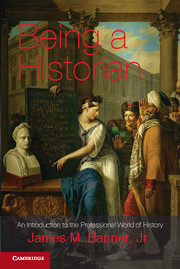Book contents
- Frontmatter
- Contents
- Preface
- Acknowledgments
- 1 The Discipline and Professions of History
- 2 The Structure of the Discipline of History
- 3 A Multitude of Opportunities
- 4 The Academic Trinity
- 5 History outside the Academy
- 6 Teaching and Writing History
- 7 Professional Principles, Responsibilities, Rights
- 8 Being Oneself as Historian
- Index
- References
5 - History outside the Academy
Published online by Cambridge University Press: 05 June 2012
- Frontmatter
- Contents
- Preface
- Acknowledgments
- 1 The Discipline and Professions of History
- 2 The Structure of the Discipline of History
- 3 A Multitude of Opportunities
- 4 The Academic Trinity
- 5 History outside the Academy
- 6 Teaching and Writing History
- 7 Professional Principles, Responsibilities, Rights
- 8 Being Oneself as Historian
- Index
- References
Summary
Those who enter upon graduate study in history are not preparing themselves simply to undertake research and produce scholarship that advances human knowledge. They are – or at least should be – also commencing their preparation to be historians in the full sense of that term, people whose aim it is to discover meaning in the past and to create meaning in the present for all who seek to find in historical knowledge an anchor in the world or a source of knowledge and pleasure. Such students ought to be seeking to gain not only the skills of research scholarship but also the ability to convey historical knowledge to others through whatever means are appropriate and the capacity to help their fellow citizens understand life by reference to its origins in times before their own. Yet most graduate history programs prepare their doctoral candidates only to become scholars – to undertake historical research and to produce written scholarship. Few graduate faculties in history encourage their students to consider as career choices all professional pursuits that are open to them, pursuits among which they should be prepared to make reasoned, rather than reflexive, choices. Consequently, graduate students in history are usually left to learn of many, perhaps of most, components of their discipline on their own, and they have to struggle especially hard to learn of those professions of history and occupations for historians that are not academic.
That should not surprise us. The weight of inertial forces, especially those that can reasonably be said to have brought about more than serviceable results over time – great scholarship, for instance – are always due more than grudging respect. Perhaps, too, given the ever-increasing variety of historical subjects and practices, we should realistically expect graduate schools to select and then emphasize in their programs of instruction only a fraction of what might be offered in a curriculum that already requires many years to complete – providing that these emphases exhibit evidence of conscious deliberation, not inadvertence or convention, in their selection. Nevertheless, to create research scholars is how most Ph.D.-granting history departments envisage their principal function. More, but still too few, prepare their students to teach, although teaching is, after all, what a majority of those entering academic employment will do and be paid to do on receipt of their degrees.
- Type
- Chapter
- Information
- Being a HistorianAn Introduction to the Professional World of History, pp. 121 - 175Publisher: Cambridge University PressPrint publication year: 2012



